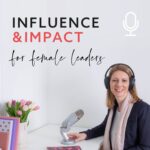Do you feel like your ability to do a good job depends on how much experience or how many skills or qualifications you have? And you never feel like you have enough.
Do you worry that you don’t know enough to confidently answer questions in meetings or move to the next level in your career?
If you’re nodding your head, then this week’s episode is a must listen. I share:
- The very real reason why women doubt their skills and experience more than men do
- Why the desire to be seen as an expert could be holding you back and how to recognise this
- How to feel confident NOT knowing all the answers
You worth at work is not determined by how much you know and I hope this episode reminds you of that.
HELPFUL LINKS
The Secret Thoughts of Successful Women: Why Capable People Suffer from the Impostor Syndrome and How to Thrive in Spite of It – Valerie Young: https://www.amazon.com.au/Secret-Thoughts-Successful-Women-Impostor-ebook/dp/B004KPM1N0
ORDER MY BOOK
“Closing The Influence Gap: A practical guide for women leaders who want to be heard” is now in paperback and on Kindle.
Closing the Influence Gap empowers women leaders to successfully navigate the workplace, leading their way and changing it for the better. It is a reference tool packed with practical strategies and a troubleshooting section which women can draw on daily to tackle the challenging conversations, decisions and situations they face.
Find out more and order you copy here: https://www.carlamillertraining.com/book
WORK WITH ME:
If you’d like to talk to me about working together do book a call.
How I work with individuals:
- 1:1 executive coaching
- Be Bolder confidence and assertiveness course
- Influence & Impact women’s leadership programme
How I work with organisations:
- Confidence training
- Women’s leadership masterclasses and programmes
- Allyship training
- Keynote speaking
Get in touch to find out more or book a call with me.
Keynotes, training and coaching: https://www.carlamillertraining.com/employers
Influence & Impact: https://www.carlamillertraining.com/influence-impact
Be Bolder: https://www.carlamillertraining.com/be-bolder
CONNECT WITH ME:
LinkedIn: https://www.linkedin.com/in/carlamiller1/
Instagram: https://www.instagram.com/thisiscarlamiller/
Website: https://www.carlamillertraining.com/
HOW CAN I SUPPORT THE PODCAST?
Subscribe
Share this episode with a friend
Leave a review on Apple Podcasts or Spotify
I would love to hear your feedback on this week’s podcast. Please leave a review or come say hello on social!
Thank you for listening, see you next week!
